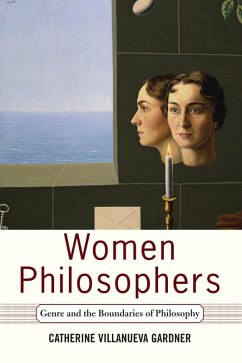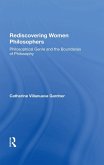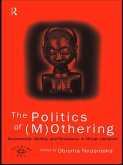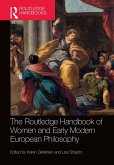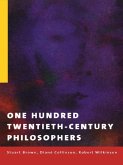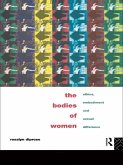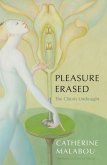46,95 €
46,95 €
inkl. MwSt.
Sofort per Download lieferbar

23 °P sammeln
46,95 €
Als Download kaufen

46,95 €
inkl. MwSt.
Sofort per Download lieferbar

23 °P sammeln
Jetzt verschenken
Alle Infos zum eBook verschenken
46,95 €
inkl. MwSt.
Sofort per Download lieferbar
Alle Infos zum eBook verschenken

23 °P sammeln
- Format: ePub
- Merkliste
- Auf die Merkliste
- Bewerten Bewerten
- Teilen
- Produkt teilen
- Produkterinnerung
- Produkterinnerung

Bitte loggen Sie sich zunächst in Ihr Kundenkonto ein oder registrieren Sie sich bei
bücher.de, um das eBook-Abo tolino select nutzen zu können.
Hier können Sie sich einloggen
Hier können Sie sich einloggen
Sie sind bereits eingeloggt. Klicken Sie auf 2. tolino select Abo, um fortzufahren.

Bitte loggen Sie sich zunächst in Ihr Kundenkonto ein oder registrieren Sie sich bei bücher.de, um das eBook-Abo tolino select nutzen zu können.
This book recovers the work of forgotten or misunderstood women philosophers from the history of philosophy
- Geräte: eReader
- ohne Kopierschutz
- eBook Hilfe
- Größe: 0.52MB
Andere Kunden interessierten sich auch für
![Rediscovering Women Philosophers (eBook, ePUB) Rediscovering Women Philosophers (eBook, ePUB)]() Catherine Ann W GardnerRediscovering Women Philosophers (eBook, ePUB)52,95 €
Catherine Ann W GardnerRediscovering Women Philosophers (eBook, ePUB)52,95 €![The Politics of (M)Othering (eBook, ePUB) The Politics of (M)Othering (eBook, ePUB)]() The Politics of (M)Othering (eBook, ePUB)39,95 €
The Politics of (M)Othering (eBook, ePUB)39,95 €![The Routledge Handbook of Women and Early Modern European Philosophy (eBook, ePUB) The Routledge Handbook of Women and Early Modern European Philosophy (eBook, ePUB)]() The Routledge Handbook of Women and Early Modern European Philosophy (eBook, ePUB)46,95 €
The Routledge Handbook of Women and Early Modern European Philosophy (eBook, ePUB)46,95 €![One Hundred Twentieth-Century Philosophers (eBook, ePUB) One Hundred Twentieth-Century Philosophers (eBook, ePUB)]() One Hundred Twentieth-Century Philosophers (eBook, ePUB)39,95 €
One Hundred Twentieth-Century Philosophers (eBook, ePUB)39,95 €![The Bodies of Women (eBook, ePUB) The Bodies of Women (eBook, ePUB)]() Rosalyn DiproseThe Bodies of Women (eBook, ePUB)40,95 €
Rosalyn DiproseThe Bodies of Women (eBook, ePUB)40,95 €![Selfish Women (eBook, ePUB) Selfish Women (eBook, ePUB)]() Lisa DowningSelfish Women (eBook, ePUB)38,95 €
Lisa DowningSelfish Women (eBook, ePUB)38,95 €![Pleasure Erased (eBook, ePUB) Pleasure Erased (eBook, ePUB)]() Catherine MalabouPleasure Erased (eBook, ePUB)10,99 €
Catherine MalabouPleasure Erased (eBook, ePUB)10,99 €-
-
-
This book recovers the work of forgotten or misunderstood women philosophers from the history of philosophy
Dieser Download kann aus rechtlichen Gründen nur mit Rechnungsadresse in A, B, BG, CY, CZ, D, DK, EW, E, FIN, F, GR, HR, H, IRL, I, LT, L, LR, M, NL, PL, P, R, S, SLO, SK ausgeliefert werden.
Produktdetails
- Produktdetails
- Verlag: Taylor & Francis eBooks
- Seitenzahl: 216
- Erscheinungstermin: 4. Mai 2018
- Englisch
- ISBN-13: 9780429982637
- Artikelnr.: 56836533
- Verlag: Taylor & Francis eBooks
- Seitenzahl: 216
- Erscheinungstermin: 4. Mai 2018
- Englisch
- ISBN-13: 9780429982637
- Artikelnr.: 56836533
- Herstellerkennzeichnung Die Herstellerinformationen sind derzeit nicht verfügbar.
Catherine Villanueva Gardner
Acknowledgments
1. Introduction
Preliminaries
The Exclusion
The Dominant Model of Moral Philosophy
Philosophical Genre and the Dominant Model
Five Forms, Five Philosophers
2. Catharine Macaulay's Letters on Education: What Constitutes a Philosophical System?
Biography
Letters on Education,
The Problems of the Epistolary Form
Macaulay's Work
The Argument for Women
The Second and Third Parts of Letters on Education,
The Argument of Letters on Education,
Conclusion
3. Allegory and Moral Philosophy in Christine de Pisan's The Book of the City of Ladies
Christine de Pisan
The Book of the City of Ladies,
The Situation of Women
Women and Moral Agency
The Question of Marriage
The Prudent Woman
The Problem
The Allegorical City
The Need for Allegory
Problems with the City
Conclusion
4. Mary Wollstonecraft and the Separation of Poetry and Politics
Wollstonecraft's Corpus
The Second Vindication as an Enlightenment Treatise
The Second Vindication Is Not a Work of Enlightenment Philosophy
Principles of Form and Expression
Form and Sensibility
True Sensibility
The Philosophical Role of Sensibility
Conclusion
5. George Eliot and How to Read Novels as Philosophy
Eliot's Work
Comte, Spinoza, and Eliot
How to Read Eliot
The Centrality of Sympathy in Eliot's Novels
Philosophy
Conclusion
6. Knowing and Speaking of Divine Love: Mechthild of Magdeburg
Biography
Women and Writing
The Problem of Authority
The Authorship of God
Morality and Experience
The Forms in the Flowing Light
Conclusion: Contingencies
7. Conclusion
Philosophical Genre and the Boundaries of Philosophy
A Few Comments on Content
References
Index
1. Introduction
Preliminaries
The Exclusion
The Dominant Model of Moral Philosophy
Philosophical Genre and the Dominant Model
Five Forms, Five Philosophers
2. Catharine Macaulay's Letters on Education: What Constitutes a Philosophical System?
Biography
Letters on Education,
The Problems of the Epistolary Form
Macaulay's Work
The Argument for Women
The Second and Third Parts of Letters on Education,
The Argument of Letters on Education,
Conclusion
3. Allegory and Moral Philosophy in Christine de Pisan's The Book of the City of Ladies
Christine de Pisan
The Book of the City of Ladies,
The Situation of Women
Women and Moral Agency
The Question of Marriage
The Prudent Woman
The Problem
The Allegorical City
The Need for Allegory
Problems with the City
Conclusion
4. Mary Wollstonecraft and the Separation of Poetry and Politics
Wollstonecraft's Corpus
The Second Vindication as an Enlightenment Treatise
The Second Vindication Is Not a Work of Enlightenment Philosophy
Principles of Form and Expression
Form and Sensibility
True Sensibility
The Philosophical Role of Sensibility
Conclusion
5. George Eliot and How to Read Novels as Philosophy
Eliot's Work
Comte, Spinoza, and Eliot
How to Read Eliot
The Centrality of Sympathy in Eliot's Novels
Philosophy
Conclusion
6. Knowing and Speaking of Divine Love: Mechthild of Magdeburg
Biography
Women and Writing
The Problem of Authority
The Authorship of God
Morality and Experience
The Forms in the Flowing Light
Conclusion: Contingencies
7. Conclusion
Philosophical Genre and the Boundaries of Philosophy
A Few Comments on Content
References
Index
Acknowledgments
1. Introduction
Preliminaries
The Exclusion
The Dominant Model of Moral Philosophy
Philosophical Genre and the Dominant Model
Five Forms, Five Philosophers
2. Catharine Macaulay's Letters on Education: What Constitutes a Philosophical System?
Biography
Letters on Education,
The Problems of the Epistolary Form
Macaulay's Work
The Argument for Women
The Second and Third Parts of Letters on Education,
The Argument of Letters on Education,
Conclusion
3. Allegory and Moral Philosophy in Christine de Pisan's The Book of the City of Ladies
Christine de Pisan
The Book of the City of Ladies,
The Situation of Women
Women and Moral Agency
The Question of Marriage
The Prudent Woman
The Problem
The Allegorical City
The Need for Allegory
Problems with the City
Conclusion
4. Mary Wollstonecraft and the Separation of Poetry and Politics
Wollstonecraft's Corpus
The Second Vindication as an Enlightenment Treatise
The Second Vindication Is Not a Work of Enlightenment Philosophy
Principles of Form and Expression
Form and Sensibility
True Sensibility
The Philosophical Role of Sensibility
Conclusion
5. George Eliot and How to Read Novels as Philosophy
Eliot's Work
Comte, Spinoza, and Eliot
How to Read Eliot
The Centrality of Sympathy in Eliot's Novels
Philosophy
Conclusion
6. Knowing and Speaking of Divine Love: Mechthild of Magdeburg
Biography
Women and Writing
The Problem of Authority
The Authorship of God
Morality and Experience
The Forms in the Flowing Light
Conclusion: Contingencies
7. Conclusion
Philosophical Genre and the Boundaries of Philosophy
A Few Comments on Content
References
Index
1. Introduction
Preliminaries
The Exclusion
The Dominant Model of Moral Philosophy
Philosophical Genre and the Dominant Model
Five Forms, Five Philosophers
2. Catharine Macaulay's Letters on Education: What Constitutes a Philosophical System?
Biography
Letters on Education,
The Problems of the Epistolary Form
Macaulay's Work
The Argument for Women
The Second and Third Parts of Letters on Education,
The Argument of Letters on Education,
Conclusion
3. Allegory and Moral Philosophy in Christine de Pisan's The Book of the City of Ladies
Christine de Pisan
The Book of the City of Ladies,
The Situation of Women
Women and Moral Agency
The Question of Marriage
The Prudent Woman
The Problem
The Allegorical City
The Need for Allegory
Problems with the City
Conclusion
4. Mary Wollstonecraft and the Separation of Poetry and Politics
Wollstonecraft's Corpus
The Second Vindication as an Enlightenment Treatise
The Second Vindication Is Not a Work of Enlightenment Philosophy
Principles of Form and Expression
Form and Sensibility
True Sensibility
The Philosophical Role of Sensibility
Conclusion
5. George Eliot and How to Read Novels as Philosophy
Eliot's Work
Comte, Spinoza, and Eliot
How to Read Eliot
The Centrality of Sympathy in Eliot's Novels
Philosophy
Conclusion
6. Knowing and Speaking of Divine Love: Mechthild of Magdeburg
Biography
Women and Writing
The Problem of Authority
The Authorship of God
Morality and Experience
The Forms in the Flowing Light
Conclusion: Contingencies
7. Conclusion
Philosophical Genre and the Boundaries of Philosophy
A Few Comments on Content
References
Index
